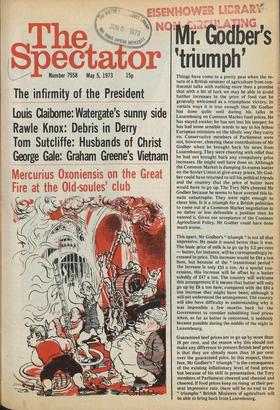Things have come to a pretty pass when the return
of a British minister of agriculture from continental talks with nothing more than a promise that with a bit of luck we may be able to avoid further increases in the price of food can be generally welcomed as a triumphant victory. In certain ways it is true enough that Mr Godber has done quite well during his talks in Luxembourg on Common Market food prices. He has stayed awake; he has not lost his temper; he has had some sensible words to say to his fellow European ministers on the idiotic way they carry on. Conservative members of Parliament were not, however, cheering these contributions of Mr Godber when he brought back his news from Luxembourg. They were cheering with relief that he had not brought back any compulsory price increases. He might well have done so. Although the Common Market is dumping its excess butter on the Soviet Union at give-away prices, Mr Godber could have returned to tell his political friends and the country that the price of butter here would have to go up. The Tory MPs cheered Mr Godber because he seems to have averted this lunatic catastrophe. They were right enough to cheer him. It is a triumph for a British politician to come out of a Common Market negotiation in no dafter or less defensible a position than he entered it. Given our acceptance of the Common Agricultural Policy, Mr Godber could have done much worse.
This apart, Mr Godber's " triumph "is not all that impressive. He made it sound better than it was. The basic price of milk is to go up by 5.5 per cent — butter, for instance, will be correspondingly increased in price. This increase would be £84 a ton here, but because of the "transitional period" the increase is only £55 a ton. As a special concession, this increase will be offset by a butter subsidy of £47 a ton. The country will welcome this arrangement if it means that butter will only go up by £8 a ton here, compared with the £84 a ton increase that might have been; although it will not understand the arrangement. 'the country will also have difficulty in understanding why it was impossible a few months back for the Government to consider subsidising food prices when, as far as butter is concerned, it suddenly became possible during the middle of the night in Luxembourg.
Guaranteed beef prices are to go up by more than 10 per cent, and the reason why this should not make any difference to present British beef prices is that they are already more than 10 per cent over the guaranteed price. In this respect, therefore, Mr Godber's " triumph" is the consequence of the existing inflationary level of food prices, but because of his skill in presentation, the Tory members of Parliament cheered and cheered and cheered. If food prices keep on rising at their present impressive rate, there will be no end to the " triumphs " British Ministers of agriculture will be able to bring back from Luxembourg.


































